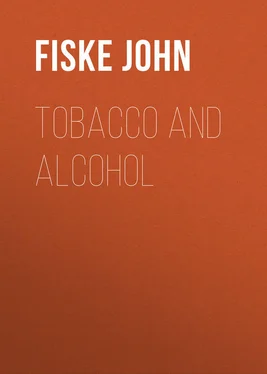John Fiske - Tobacco and Alcohol
Здесь есть возможность читать онлайн «John Fiske - Tobacco and Alcohol» — ознакомительный отрывок электронной книги совершенно бесплатно, а после прочтения отрывка купить полную версию. В некоторых случаях можно слушать аудио, скачать через торрент в формате fb2 и присутствует краткое содержание. Жанр: foreign_antique, foreign_prose, на английском языке. Описание произведения, (предисловие) а так же отзывы посетителей доступны на портале библиотеки ЛибКат.
- Название:Tobacco and Alcohol
- Автор:
- Жанр:
- Год:неизвестен
- ISBN:нет данных
- Рейтинг книги:4 / 5. Голосов: 1
-
Избранное:Добавить в избранное
- Отзывы:
-
Ваша оценка:
- 80
- 1
- 2
- 3
- 4
- 5
Tobacco and Alcohol: краткое содержание, описание и аннотация
Предлагаем к чтению аннотацию, описание, краткое содержание или предисловие (зависит от того, что написал сам автор книги «Tobacco and Alcohol»). Если вы не нашли необходимую информацию о книге — напишите в комментариях, мы постараемся отыскать её.
Tobacco and Alcohol — читать онлайн ознакомительный отрывок
Ниже представлен текст книги, разбитый по страницам. Система сохранения места последней прочитанной страницы, позволяет с удобством читать онлайн бесплатно книгу «Tobacco and Alcohol», без необходимости каждый раз заново искать на чём Вы остановились. Поставьте закладку, и сможете в любой момент перейти на страницу, на которой закончили чтение.
Интервал:
Закладка:
Having thus said his say about muscular men, Mr. Parton goes on to declare that smoking is a barbarism. "There is something in the practice that allies a man with barbarians, and constantly tends to make him think and talk like a barbarian." We suppose Mr. Parton must know this; for he does not attempt to prove it, unless indeed he considers a rather stupid anecdote to be proof. He tells us how he listened for an hour or so to half a dozen Yale students in one of the public rooms of a New-Haven hotel, talking with a stable-keeper about boat-racing. They swore horribly; and of course Mr. Parton believes that if they had not been smokers they would neither have used profane language nor have condescended to talk with stable-keepers. Sancta simplicitas!
"We must admit, too, I think, that smoking dulls a man's sense of the rights of others. Horace Greeley is accustomed to sum up his opinions upon this branch of the subject by saying: 'When a man begins to smoke, he immediately becomes a hog.'" Our keen enjoyment of Mr. Greeley's lightness of touch and refined delicacy of expression should not be allowed to blind us to the possible incompleteness of his generalization. What! Milton a hog? Locke, Addison, Scott, Thackeray, Robert Hall, Christopher North – hogs?
And then smoking is an expensive habit. If a man smoke ten cigars daily, at twenty cents each, his smoking will cost him from seven to eight hundred dollars a year. This dark view of the case needs to be enlivened by a little contrast. "While at Cambridge the other day, looking about among the ancient barracks in which the students live, I had the curiosity to ask concerning the salaries of the professors in Harvard College." Probably he inquired of a Goody , or of one of the Pocos who are to be found earning bread by the sweat of their brows in the neighbourhood of these venerable shanties, for it seems they told him that the professors were paid fifteen or eighteen hundred dollars a year. Had he taken the trouble to step into the steward's office, he might have learned that they are paid three thousand dollars a year. Such is the truly artistic way in which Mr. Parton makes contrasts – $1500 per annum for a professor, $800 for cigars! Therefore, it does not pay to smoke.
Smoking, moreover, makes men slaves. The Turks and Persians are great smokers, and they live under a despotic form of government. Q.E.D. The extreme liberality of Oriental institutions before the introduction of tobacco Mr. Parton probably thinks so well known as not to require mention. But still worse, the Turks and Persians are great despisers of women; and this is evidently because they smoke. For woman and tobacco are natural enemies. The most perfect of men, the "highly-groomed" Goethe – as Mr. Parton elegantly calls him – loved women and hated tobacco. This aspect of the question is really a serious one. Tobacco, says our reformer, is woman's rival, – and her successful rival; therefore she hates it. For as Mr. Parton, with profound insight into the mysteries of the feminine character, gravely observes, "women do not disapprove their rivals; they hate them." This "ridiculous brown leaf," then, is not only in general the cause of all evil, but in particular it is the foe of woman. "It takes off the edge of virility"!! 2 2 When we first read this remark, we took it for a mere burst of impassioned rhetoric; but on second thoughts, it appears to have a meaning. Another knight-errant in physiology charges tobacco with producing "giddiness, sickness, vomiting, vitiated taste of the mouth, loose bowels, diseased liver, congestion of the brain, apoplexy, palsy, mania, loss of memory, amaurosis, deafness, nervousness, emasculation , and cowardice." Lizars, On Tobacco , p. 29. A goodly array of bugbears, quite aptly illustrating the remark of one of our medical professors, that hygienic reformers, in the length of their lists of imaginary diseases, are excelled only by the itinerant charlatans who vend panaceas. There is, however, no scientific foundation for the statement that tobacco "takes off the edge of virility." The reader who is interested in this question may consult Orfila, Toxicologie , tom. II. p. 527; Annales d'Hygiène , tom. XXXVIII.; and a Memoir by Laycock in the London Medical Gazette , 1846, tom. III.
It makes us regard woman from the Black Crook point of view. If it had not been for tobacco, that wretched phantasmagoria would not have had a run of a dozen nights. "Science" justifies this conjecture, and even if it did not, Mr. Parton intimates that he should make it. Doubtless!
One bit of Mr. Parton's philosophy still calls for brief comment. He wishes to speak of the general tendency of the poor man's pipe; and he means to say "that it tends to make him satisfied with a lot which it is his chief and immediate duty to alleviate, – he ought to hate and loathe his tenement-house home." A fine specimen of the dyspeptic philosophy of radicalism! Despise all you have got, because you cannot have something better. We believe it is sometimes described as the philosophy of progress. There can of course be no doubt that Mr. Parton's hod-carrier will work all the better next day, if he only spends the night in fretting and getting peevish over his "tenement-house home."
Such then, in sum and substance, is our reformer's indictment against tobacco. It lowers the tone of our systems, and it makes us contented; it wastes money, it allies us with barbarians, and it transforms us — mira quadam metamorphosi – into swine. Goethe, therefore, did not smoke, the Coming Man will not smoke, and General Grant, with tardy repentance, "has reduced his daily allowance of cigars." And as for Mr. Buckle, the author of an able book which Mr. Parton rather too enthusiastically calls "the most valuable work of this century," – if Mr. Buckle had but lived, he would doubtless have inserted a chapter in his "History," in which tobacco would have been ranked with theology, as one of the obstacles to civilization.
Читать дальшеИнтервал:
Закладка:
Похожие книги на «Tobacco and Alcohol»
Представляем Вашему вниманию похожие книги на «Tobacco and Alcohol» списком для выбора. Мы отобрали схожую по названию и смыслу литературу в надежде предоставить читателям больше вариантов отыскать новые, интересные, ещё непрочитанные произведения.
Обсуждение, отзывы о книге «Tobacco and Alcohol» и просто собственные мнения читателей. Оставьте ваши комментарии, напишите, что Вы думаете о произведении, его смысле или главных героях. Укажите что конкретно понравилось, а что нет, и почему Вы так считаете.












